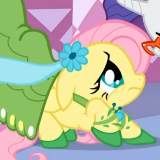Grammer a Week 8: Hierarchy of Adjectives · 11:14pm Mar 27th, 2015
This is Grammer a Week, the periodic blog program-thing where I address a frequently broken grammar rule and tell you how to fix it. This week's installment is about the proper ordering of adjectives. Consider a pony who is young, Equestrian, purple, and smart. It's Twilight, right? Simple. Now consider a young Equestrian purple smart pony. Well, the pony's still Twilight, but she'd yell at you for using your adjectives so irresponsibly.
So, what gives? Why is the first example at least somewhat acceptable but the second so unnatural? The answer has to do with a little rule called the hierarchy of adjectives. When you've got multiple adjectives describing a single object, there's a proper order those adjectives have to be ordered in for the phrase to sound natural. So, in the case above, you'd probably properly describe Twilight as a smart young purple Equestrian pony.
How did you come up with that order, though? Chances are if you're a native English speaker (or at least have studied it for a significant portion of your life), that order came naturally to you. It just sounds right. But what makes it right, and how would you describe that right-ness to a non-native English speaker? Turns out there is a logical explanation, and it goes like this:
Opinion
Size
Age
Color
Nationality
Material
When multiple adjectives describe a single subject, you must order them in the order above, from top to bottom. Taking our previous example again, our smart young purple Equestrian pony does follow this order (opinion > age > color > nationality).
The ordering is as such, because—according to one theory—when using this order, the first adjectives you say are more intrinsic to the speaker, but the last adjectives are more intrinsic to the object. You—theoretically—could argue with Twilight that she is not smart. That's an opinion intrinsic to the person describing her. You would, however, have a very difficult time trying to argue with her that she is not Equestrian. There's actually a lot of debate as to why this order exists, but this is the explanation that makes the most sense to me.
Let's take a different example. Say you have a pony who is fast, awesome, blue, and radical. Rainbow Dash, right? But consider a fast awesome blue radical pony. How would this be ordered?
First, order the adjectives. We have fast (opinion), awesome (opinion), blue (color), and radical (opinion). Though Rainbow would probably argue with you that those adjectives are not opinions, but facts, the fact remains that there are three adjectives that are on the same hierarchical level. When this happens, the best practice is to order them as you would according to the hierarchy above, and separate by comma the adjectives of the same level.
So, the final result would be a fast, awesome, radical blue pony. Because three of the adjectives are again opinion, their order is interchangeable, because the hierarchy remains the same. So awesome, fast, radical blue pony; awesome, radical, fast blue pony; fast, radical, awesome blue pony; radical, fast, awesome blue pony; and radical, awesome, fast blue pony would all be acceptable.
As with any rule in the English language, there are exceptions, and these are the ones that would infuriate an ESL student because they don't always necessarily make logical sense. Take big bad dog, for example. It's in the wrong order (size < opinion), but it sounds better than bad big dog. Or genuine magic wand. The adjectives are both opinions, but you wouldn't call it a magic genuine wand.
There's a whole load of debate on this subject and other ones (like intrinsic and subsective adjectives) on this subject that I won't dig into because this post is already long enough, but just follow these rules, be consistent, and you'll be alright (most of the time). If you're a native English speaker, you might already do this correctly, but if you're not, I certainly won't hold it against you that you don't get this well-known but ill-substantiated rule correct every time.
Thanks for reading! If you have any questions or comments, please post them below. I'm always open to suggestions for future Grammer a Week posts.



In this case, isn't "genuine" kind of describing both "magic" AND "wand"?
2917010
You are correct, though that's only if you subscribe to "magic wand" as a single noun cluster (which, admittedly, most people do). If you wanna get really technical, "magic" in this case is an attributive adjective of sorts; it's an opinion, but it's sorta intrinsic to "wand."
This is where the debate starts. If you want something to really confusing, try "[fake↔Italian] marble." That phrases completely transcends these rules. It's easy to elucidate its meaning, but it doesn't really have a rule.
I didn't know there was a hierarchy of adjectives. I guess there really are grammar rules for everything.
2917091
"Fake Italian marble" = something that pretended to be Italian marble. It might actually have come from anywhere. It could in fact be marble -- just not Italian marble.
"Italian fake marble" = something that pretended to be marble, but definitely did come from Italy.
2917152
It's just one of those rules that you don't know exist because almost every native English speaker understands it intuitively.
2917166
I actually do understand that one; it's just one of those cases where a rule doesn't really exist for it. And it definitely kind of contradicts the rule I discussed in the blog.
2917192 Aha, I see. Sorry; I'm a bit under the weather right now, so probably not picking up on these things very well!